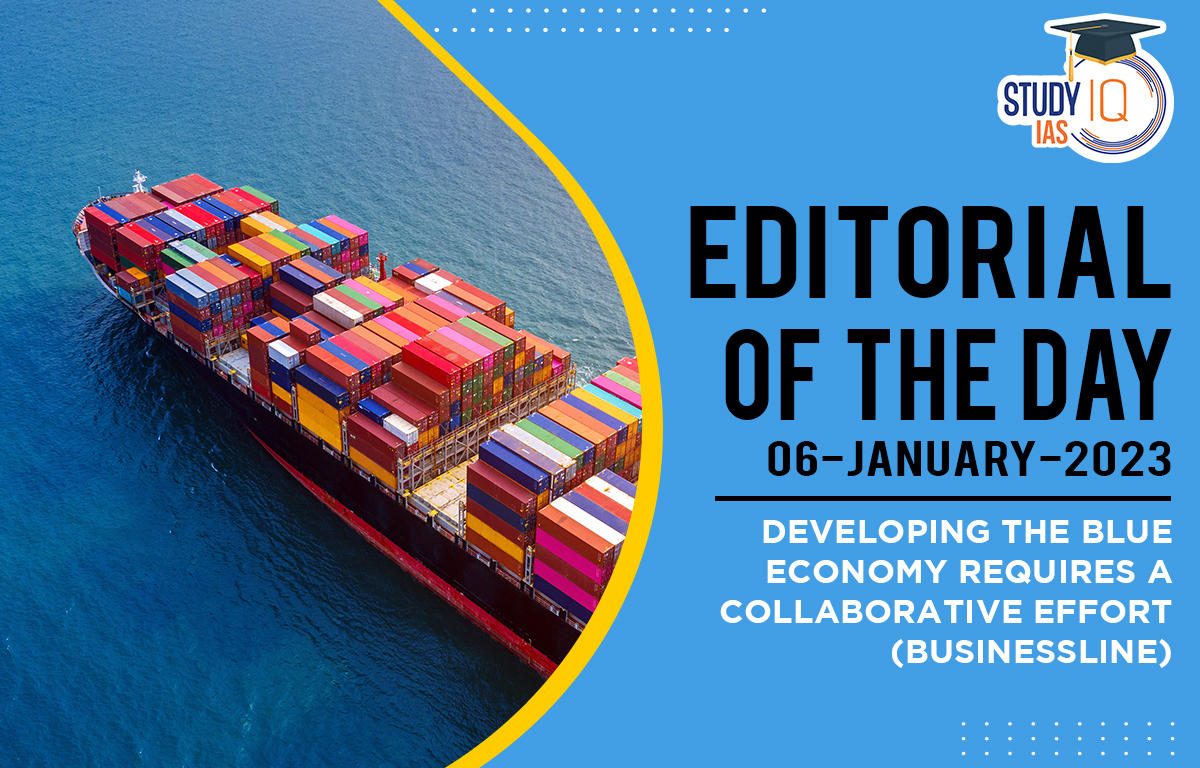Table of Contents
Exam View: National Fisheries Policy, Sustainable development, Gross Domestic Product (GDP), Indian Ocean Dipole, Palk Bay, Deep Ocean Mission, Sagar Mala Project, Integrated Coastal Zone Management, Challenges and Government Initiative.
In News: Developing the blue economy requires a collaborative effort.
- Blue Economy is defined by the World Bank as the “sustainable use of ocean resources for economic growth, improved livelihoods, and jobs while preserving the health of the ecosystem.”
- For its ties to economic growth, environmental sustainability, and national security, the blue economy generally refers to the multitude of ocean resources accessible in the country that can be utilized to aid in the creation of goods and services.
- The blue economy offers coastal nations like India a huge socioeconomic opportunity to responsibly use ocean resources for societal benefit. The rise in demand of ocean-linked products such as seafood, energy generation, etc. has led to the growth of the Blue Economy globally, with estimated global turnover ranging between US$ 3-6 trillion annually.
Changwon Declaration
- Signed during the Fourth Ministerial Forum on the Sustainable Development Strategy for the Seas of East Asia (SDS-SEA) in 2012, the Changwon Declaration reflects on the progress made over the past three years with the implementation of the SDS-SEA, and ensures the continued progress towards a sustainable future, including the development of an ocean-based blue economy.
- Ministers from 10 countries of the East Asian Seas (EAS) signed the declaration. The Declaration is the region’s support for the implementation of the Rio+20 Outcomes embodied in “The Future We Want,” and other relevant international and regional commitments related to coasts and oceans.
Significance of Blue Economy
- Economic Growth: India’s Blue Economy concept is multi-faceted and plays an important role in the country’s economic growth because of its enormous maritime interests. India’s blue economy accounts for roughly 4% of the GDP and is estimated to increase once the mechanism is improved.
- Harnesses Renewable Energy: There are also opportunities to develop offshore wind and solar energy in India, which could help to meet the country’s growing energy needs.
- High Return on Investment: New research commissioned by the high-level panel for a sustainable ocean economy, co-chaired by the Norwegian Prime Minister (PM), shows that every dollar invested in key ocean activities yields five times i.e. $5 in return, often more.
- Aquaculture and Marine Biotechnology: The blue economy can support the growth of these sectors, which have the potential to contribute to the country’s food security and improve the health of the ocean ecosystem.
- Synergy With SDG: It supports all the United Nations’ Sustainable Development Goals (SDGs), especially SDG14 ‘life below water’.
- Transport: With an over 7,500-km-long coastline spread across nine coastal states, 12 major, and 200 minor ports, India’s blue economy supports 95% of the country’s business through transportation and contributes an estimated 4% to its Gross Domestic Product (GDP).
- Exports: The sector has stood strong despite the challenges caused by the Covid-19 pandemic and have recorded exports worth Rs. 56,200 (US$ 7.2 billion) between April 2021-February 2022.

Challenges Related to India’s Blue Economy
- Lack of Research: A major reason for the lack of progress in fisheries and environmental management in the region is the lack of research, barring a small body of biological and physical scientific data. It is imperative to pursue research directed at improving the technical knowledge of the seabed, and sea column as well as the behaviours of those whose livelihoods are dependent on the health of the ocean.
- Governance Challenges: The governance arrangements of the Indian Ocean have several gaps that hinder the implementation of blue growth in the region. Moreover, a complex regulatory landscape that involves divergent sovereign laws, regional arrangements as well as international laws contributes to additional challenges.
- Increasing Urbanisation: The IORCs are faced with the common pressing challenges of increasing urbanisation, industrialisation and migration, resulting in the over-exploitation of natural marine resources.
- Issue of Food security: Food security including that of seafood, is a global challenge that is already at risk due to climate change. The Indian Ocean region is rich in seafood resources and is one of the major areas of global fishing. Over 800 million people in the region rely on seafood for their protein needs.
- Overfishing: Overfishing is a major challenge in India’s coastal waters, as it can lead to the depletion of fish stocks and harm the marine ecosystem. This can have negative impacts on the fishing industry and other sectors of the blue economy.
- Climate Change: Rising sea levels, negative Indian Ocean dipole and other impacts of climate change can pose risks to coastal communities and also have negative impacts on the blue economy.
- Marine Pollution: Pollution from sources such as oil spills, plastic waste, and industrial effluent can harm marine ecosystems and have negative impacts on the blue economy.
- Lack of Infrastructure: There is a lack of ports, airports, and other infrastructure in many coastal areas of India, which can make it difficult to develop and expand economic activities in these regions.
- India-Sri Lanka Fishing Conflict: The boundary between Indian and Sri Lankan waters in the Palk Bay is not clearly defined, which has led to confusion and conflict between Indian and Sri Lankan fishermen.
Initiatives Taken by the Government

Way Forward
- Framework for Robust Mechanism: A reliable method for periodic study must be set up in order to generate and gather credible data. An Expert Group would be formed to identify the blue economy sectors and sub-sectors, as well as to develop a measurement system.
- Sustainable framework for a National Coastal Marine: An Expert Group would be formed to recommend changes to meet the national and local needs. The CMSP (Coastal and Marine Spatial Planning) would serve as the foundation for the future development of the Blue Economy in India’s Exclusive Economic zones.
- Framework to domestic manufacturing, emerging industries, trade, tourism, technology, services and skill development connected with the BEP: In order to enhance the ease of conducting business and efficiency, logistics and connectivity will be improved along with a tax regime harmonisation.
- Framework for Ocean Governance: All the components of the policy have an underlying objective that connects them which is keeping an ocean governance structure in consideration that ensures coordination, communication, and clarity across numerous stakeholders, governmental levels, and coastal communities.
- Research and Development: Investing in research and development to improve technologies and practices in the blue economy can help to increase efficiency and reduce the negative impacts on the environment.


 Current Affairs 26th April 2024 for UPSC...
Current Affairs 26th April 2024 for UPSC...
 Editorial of the day (26th Apr): Reality...
Editorial of the day (26th Apr): Reality...
 India And G7, India has Received Invitat...
India And G7, India has Received Invitat...

















